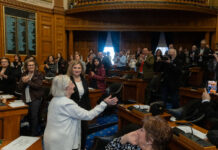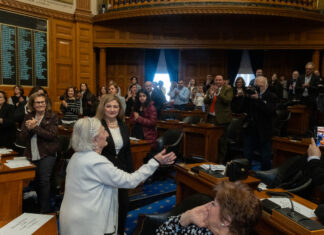By Thomas C . Nash
Special to the Mirror-Spectator
MEDFORD, Mass. — Around 100 gathered in Tufts University’s Goddard Chapel last Tuesday for a presentation by author Michael Bobelian in commemoration of the 96th anniversary of the Armenian Genocide.
The commemoration, organized by Ina Baghdiantz McCabe, Darakjian and Jafarian Chair in Armenian History, began with a presentation from Bobelian titled “America and the Armenian Genocide: The Quest for Justice from Wilson to Obama.”
Bobelian’s lecture drew on his 2009 book, Children of Armenia: A Forgotten Genocide, and The Century-Long Struggle for Justice, which features interviews with many of the decision makers in Washington who have played a role in the decades of advocacy for recognition. It also features an analysis of how the first major worldwide aid effort became forgotten — including the country that spearheaded the effort.









